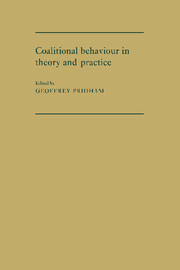Book contents
- Frontmatter
- Contents
- List of illustrations
- List of tables
- Notes on the contributors
- Preface
- 1 An inductive theoretical framework for coalitional behaviour: political parties in multi-dimensional perspective in Western Europe
- 2 Between theoretical elegance and political reality: deductive models and cabinet coalitions in Europe
- 3 Changing coalitional preferences among West German parties
- 4 The FDP and coalitional behaviour in the Federal Republic of Germany: multi-dimensional perspectives on the role of a pivotal party
- 5 Cabinet stability in the French Fourth Republic: the Ramadier coalition government of 1947
- 6 Coalition formation and maintenance in Belgium: a case-study of elite behaviour and changing cleavage structure, 1965–1981
- 7 The Dutch Christian Democratic party and coalitional behaviour in the Netherlands: a pivotal party in the face of depillarisation
- 8 Coalition or Fianna Fail? The politics of inter-party government in Ireland
- 9 Italy's party democracy and coalitional behaviour: a case-study in multi-dimensionality
- 10 Party coalitions in the first democratic period in Spain, 1977–1982
- 11 Coalitional theory and practice in Scandinavia
- 12 Multi-dimensional approaches to the study of local coalitions: some cross-national comparisons
- 13 Research notes
- Index
9 - Italy's party democracy and coalitional behaviour: a case-study in multi-dimensionality
Published online by Cambridge University Press: 05 November 2011
- Frontmatter
- Contents
- List of illustrations
- List of tables
- Notes on the contributors
- Preface
- 1 An inductive theoretical framework for coalitional behaviour: political parties in multi-dimensional perspective in Western Europe
- 2 Between theoretical elegance and political reality: deductive models and cabinet coalitions in Europe
- 3 Changing coalitional preferences among West German parties
- 4 The FDP and coalitional behaviour in the Federal Republic of Germany: multi-dimensional perspectives on the role of a pivotal party
- 5 Cabinet stability in the French Fourth Republic: the Ramadier coalition government of 1947
- 6 Coalition formation and maintenance in Belgium: a case-study of elite behaviour and changing cleavage structure, 1965–1981
- 7 The Dutch Christian Democratic party and coalitional behaviour in the Netherlands: a pivotal party in the face of depillarisation
- 8 Coalition or Fianna Fail? The politics of inter-party government in Ireland
- 9 Italy's party democracy and coalitional behaviour: a case-study in multi-dimensionality
- 10 Party coalitions in the first democratic period in Spain, 1977–1982
- 11 Coalitional theory and practice in Scandinavia
- 12 Multi-dimensional approaches to the study of local coalitions: some cross-national comparisons
- 13 Research notes
- Index
Summary
Introduction: the problem of one-dimensionality
Any study of coalitional behaviour in Italian politics immediately encounters two very basic problems: the problem of coverage, the fact that this subject, despite its obvious importance to the functioning of Italy's political system, has been much neglected; and the problem of interpretation or the need for explaining the dynamics of what is commonly seen and often dismissed as a complex affair. Of these two, the key problem is that of interpretation; but looking briefly at both of them assists in developing a viable approach.
The main outcome so far of this neglect of Italian coalition politics has been to reinforce the popular image of confusion and encourage one-dimensional views. Judgements have either resorted to general assumptions, such as the typical comment of one journalist that ‘Italian governmental politics are a bizarre and Byzantine game whose details are followed only by the immediate players, while the rest of the world finds it difficult even to pretend to take an interest,’ or they have focussed on particular aspects and usually institutional procedures. For instance, one summary of the process of coalition formation in Italy commented as follows rather satirically:
Rather than rolling up their sleeves and energetically giving the country a new government, the politicians bow to a form of protocol … Moving with liturgical deliberateness, the Italian President consults for one week with all living former Presidents, all former Prime Ministers, all party leaders … The crisis is not over when the President designates the man most likely to succeed. […]
Information
- Type
- Chapter
- Information
- Coalitional Behaviour in Theory and PracticeAn Inductive Model for Western Europe, pp. 198 - 231Publisher: Cambridge University PressPrint publication year: 1986
Accessibility standard: Unknown
Why this information is here
This section outlines the accessibility features of this content - including support for screen readers, full keyboard navigation and high-contrast display options. This may not be relevant for you.Accessibility Information
- 1
- Cited by
